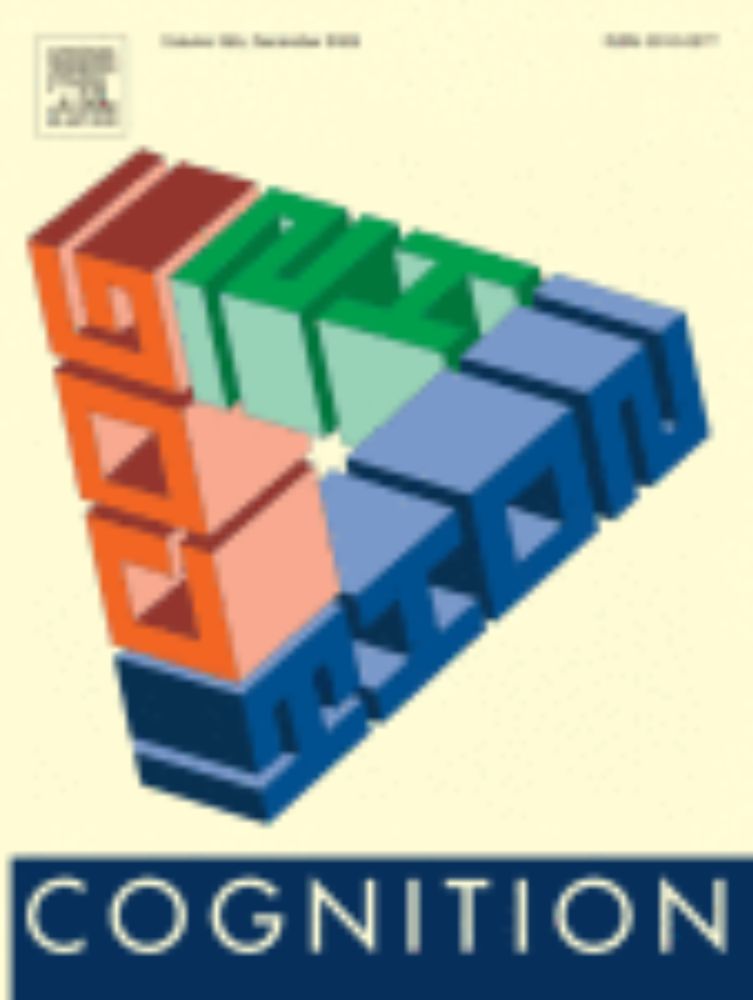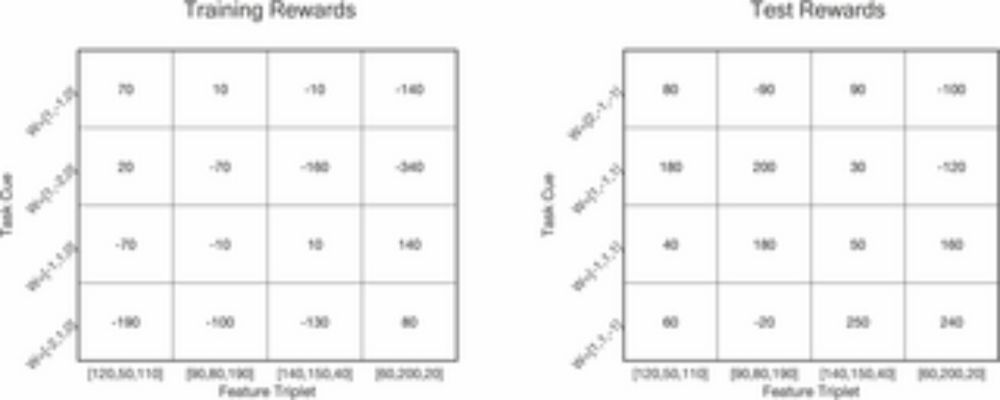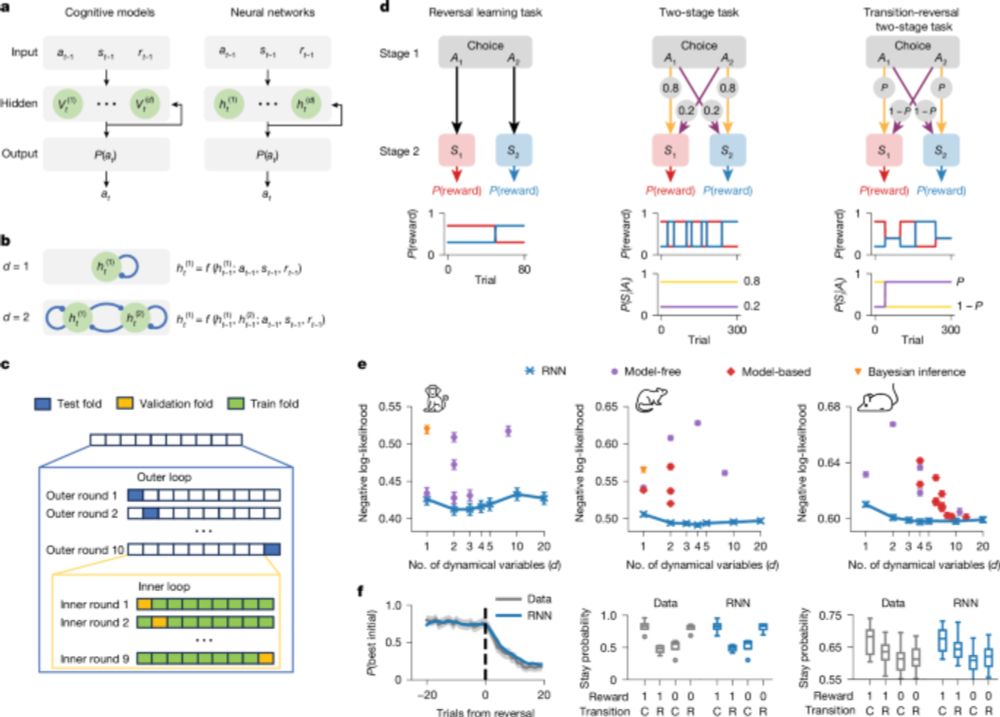
I am totally pumped about this new work . "Task-trained RNNs" are a powerful and influential framework in neuroscience, but have lacked a firm theoretical footing. This work provides one, and makes direct contact with the classical theory of random RNNs:
www.biorxiv.org/content/10.6...
04.03.2026 17:12 —
👍 81
🔁 30
💬 2
📌 3

Episodic memory encoding fluctuates at a theta rhythm of 3–10 Hz
Nature Human Behaviour - Biba et al. show that episodic memory encoding fluctuates at a theta rhythm of 3–10 Hz.
I am excited to share my first paper, showing that episodic memory formation is theta rhythmic, is now published in Nature Human Behavior! Check it out here: rdcu.be/e6pzS. Thanks to my PI, Katherine Duncan, and to my collaborators for their support on this journey! Stay tuned for iEEG follow up 🧠
02.03.2026 19:28 —
👍 100
🔁 41
💬 3
📌 2

The inferred value of unchosen options spreads to related items in memory
Counterfactual thinking — considering what could have come of choosing the other path — can facilitate inference. Previous studies have demonstrated t…
📢New paper out today in @cognitionjournal.bsky.social!
Does the value of an unchosen option — inferred through counterfactual reasoning — spread to related items in memory, similar to how the value of a chosen option — acquired through direct experience — does?
In short, yes!
28.02.2026 19:11 —
👍 59
🔁 25
💬 1
📌 0

Book cover. A silhouette of a person's head filled with colorful geometric shapes—perhaps symbolizing cognitive resources or deployment thereof. The style is attractive and modern, if generic.
text:
The Rational Use of Cognitive Resources
Falk Lieder, Frederick Callaway, Thomas L. Griffithts
I'm excited to announce that I had my first (co-authored) book published today! "The Rational Use of Cognitive Resources" with Falk Lieder and Tom Griffiths (@cocoscilab.bsky.social ). You can read it for free! (see thread)
18.02.2026 01:05 —
👍 142
🔁 45
💬 2
📌 0
Thanks, and agreed, I think our findings fit squarely with your ideas!
23.01.2026 16:28 —
👍 1
🔁 0
💬 0
📌 0
Thanks!
23.01.2026 16:14 —
👍 0
🔁 0
💬 0
📌 0
Thanks, Q!
23.01.2026 13:52 —
👍 0
🔁 0
💬 0
📌 0
In general, our work suggests that perhaps one reason why we maintain so many seemingly unnecessary details is to construct new preferences as they are needed, allowing us to flexibly adapt to changing goals.
23.01.2026 13:18 —
👍 5
🔁 0
💬 0
📌 0
This latter result comes from a new experiment added since our preprint (doi.org/10.1101/2025...), where we also find that people consistently use episodic memory this way when faced with an arbitrary number of features and episodes.
The preprint is up-to-date, in case you run into a paywall!
23.01.2026 13:18 —
👍 3
🔁 0
💬 1
📌 0
i) people generally use episodic memories in this way
ii) they mainly do so when future task demands are uncertain
iii) they store “backup” episodes to help if irrelevant details later become relevant
iv) people with more efficient retrieval strategies make better choices
23.01.2026 13:18 —
👍 4
🔁 0
💬 2
📌 0
Episodic memory allows us to store individual experiences in high fidelity. Why?
One reason may be to enable flexible behavior: we can reuse whichever details from our memories become relevant for new decisions and goals.
We tested this idea and found that…
23.01.2026 13:18 —
👍 3
🔁 0
💬 1
📌 0

Episodic memory facilitates flexible decision-making via access to detailed events - Nature Human Behaviour
Nicholas and Mattar found that people use episodic memory to make decisions when it is unclear what will be needed in the future. These findings reveal how the rich representational capacity of episod...
Our experiences have countless details, and it can be hard to know which matter.
How can we behave effectively in the future when, right now, we don't know what we'll need?
Out today in @nathumbehav.nature.com , @marcelomattar.bsky.social and I find that people solve this by using episodic memory.
23.01.2026 13:18 —
👍 130
🔁 49
💬 7
📌 2
Last term I tried an experiment: I walked into my Tech and Design Ethics class, admitted that I had *no idea* what to do about ChatGPT - so I would let them figure it out.
As in: their first project was to decide and write the ChatGPT policy for the class.
Here's what happened:
22.01.2026 23:36 —
👍 2364
🔁 869
💬 26
📌 236
APA PsycNet
🚨New Paper Alert!🚨 Now out in Emotion!
The Memory Palace Architect: Effect of Valence on Loci-Dependent Recall Performance.
We ask a simple question: does the emotional tone of a memory palace matter for recall?
Turns out: yes—and negative palaces work best.
20.01.2026 19:00 —
👍 9
🔁 2
💬 1
📌 0
When does new learning interfere with existing knowledge in people and ANNs? Great to have this out today in @nathumbehav.nature.com
Work with @summerfieldlab.bsky.social, @tsonj.bsky.social, Lukas Braun and Jan Grohn
www.nature.com/articles/s41...
31.10.2025 14:47 —
👍 65
🔁 21
💬 1
📌 0
CATS Lab
Child & Adolescent Translational Science Lab at Northwestern University
I'm recruiting PhD students for my lab at Northwestern! I'm reviewing applications for the Department of Psychology for the Cognitive Affective Neuroscience and Clinical areas, due 12/1. 🧠
Come join the CATS Lab: nucatslab.com
Learn about our latest research: iamh.northwestern.edu/research/res...
29.10.2025 18:39 —
👍 56
🔁 44
💬 2
📌 1
I’m excited to share my recent preprint on a neural network model of free recall that learns multiple memory strategies including the memory palace!
www.biorxiv.org/content/10.1...
21.10.2025 03:36 —
👍 34
🔁 16
💬 1
📌 2

Children leverage predictive representations for flexible, value-guided choice
By harnessing a mental model of how the world works, learners can make flexible choices in changing environments. However, while children and adolesce…
New paper out in cognition with @arikahn.bsky.social, @nathanieldaw.bsky.social, Cate Hartley, and @katenuss.bsky.social !!
We show that children 👶 use predictive representations (e.g. SR) to guide their choices, providing an account of how they can make flexible choices in a changing world
15.10.2025 10:52 —
👍 46
🔁 12
💬 1
📌 1
I’m super excited to finally put my recent work with @behrenstimb.bsky.social on bioRxiv, where we develop a new mechanistic theory of how PFC structures adaptive behaviour using attractor dynamics in space and time!
www.biorxiv.org/content/10.1...
24.09.2025 09:52 —
👍 219
🔁 86
💬 9
📌 9
New preprint from the lab! 🧠
Led by Juliana Trach, w/ Sophia Ou
Using fMRI, we discovered evidence for time-sensitive reward prediction errors (RPEs) in the human cerebellum.
Builds on, and extends, recent work in both rodents and NHPs
08.09.2025 14:31 —
👍 46
🔁 20
💬 2
📌 0
Successful prediction of the future enhances encoding of the present.
I am so delighted that this work found a wonderful home at Open Mind. The peer review journey was a rollercoaster but it *greatly* improved the paper.
direct.mit.edu/opmi/article...
09.08.2025 16:27 —
👍 75
🔁 22
💬 2
📌 2

Thrilled to announce that I'll be starting in January 2026 as an Assistant Professor of Psychology at Hunter College, City University of New York.
The lab will study the thought processes that underlie our decision-making.
06.08.2025 16:35 —
👍 56
🔁 5
💬 7
📌 0
Very happy to see this work with Euan Prentis posted! If you’re going to CCN next week, go check out Euan’s poster on this work!
31.07.2025 21:03 —
👍 10
🔁 5
💬 1
📌 0
My first, first author paper, comparing the properties of memory-augmented large language models and human episodic memory, out in @cp-trendscognsci.bsky.social!
authors.elsevier.com/a/1lV174sIRv...
Here’s a quick 🧵(1/n)
26.07.2025 15:05 —
👍 68
🔁 19
💬 3
📌 3
Super excited to share this one!! Meta-learning sparsity and learning rate gives rise to brain-like gradients of complementary learning systems. So complementary learning systems emerge organically through behavior optimization, and it's not just two of them!!
16.07.2025 16:18 —
👍 84
🔁 25
💬 1
📌 0
the paper looks cool, excited to dig in!
05.07.2025 10:06 —
👍 1
🔁 0
💬 0
📌 0

Neural evidence that humans reuse strategies to solve new tasks
Humans can apply solutions used in past problems to new problems. In this study, the authors reveal the neural correlates of this process, known as generalization, and show that humans apply past poli...
One way to tackle a new task is to reuse solutions from the past. Check out Sam Hall-McMaster's latest finding that strategy reuse is accompanied by neural reactivation of prior solutions @plosbiology.org
Collab w/ M Tomov & @gershbrain.bsky.social
#neuroskyence
journals.plos.org/plosbiology/...
06.06.2025 14:39 —
👍 73
🔁 19
💬 1
📌 0











